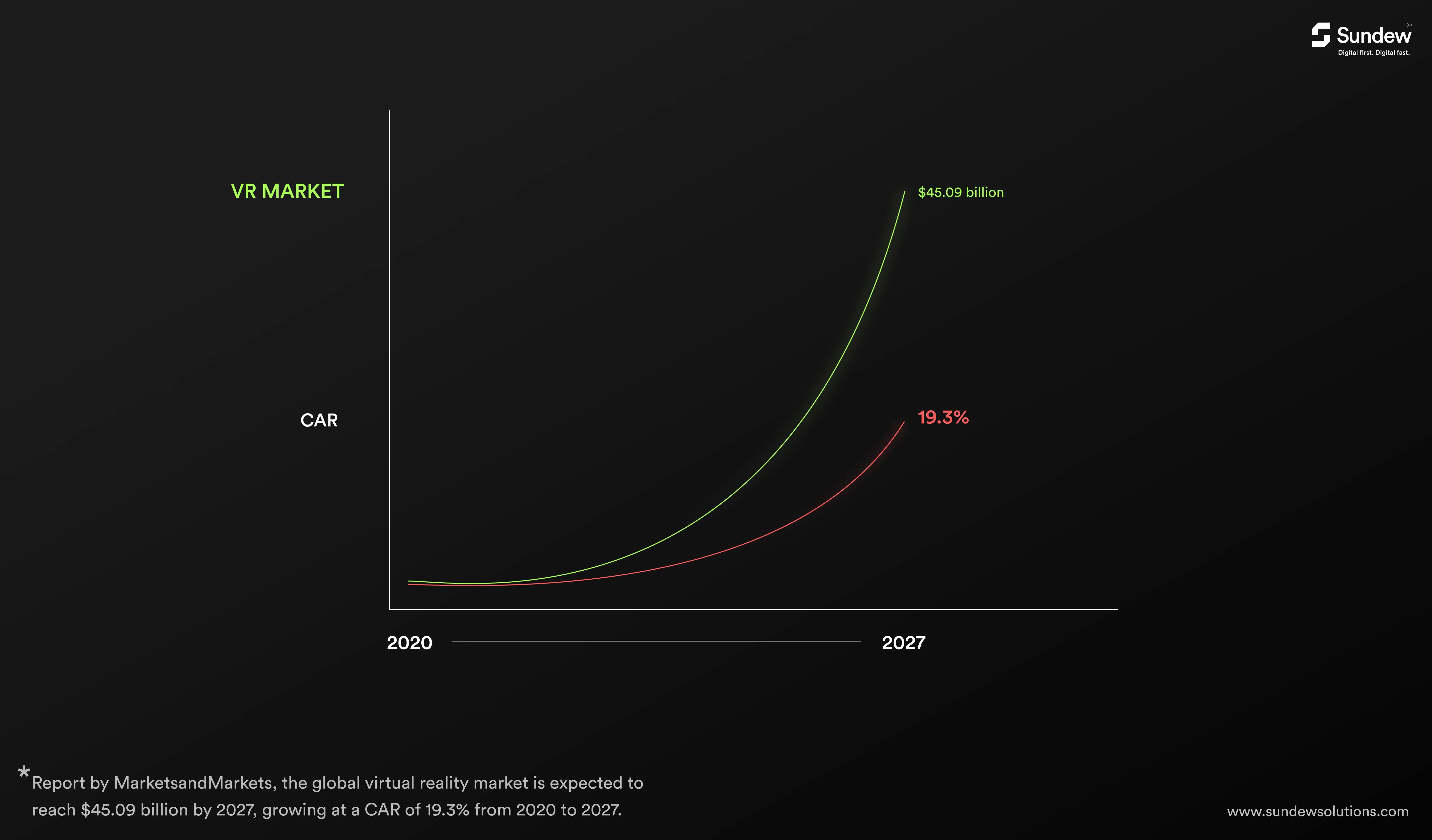The Power of Data Visualization Using Tableau
Top 5 Retail Industry Trends for 2023
According to a report by MarketsandMarkets, the global virtual reality market is expected to reach $45.09 billion by 2027, growing at a CAGR of 19.3% from 2020 to 2027.
The recent global disruptions have made supply chain vulnerabilities glaringly apparent. Its impact was felt more by the retail industry than any other industry. Today the retail industry is grappling with issues ranging from inflation, relentlessly changing customer demands, supply chain risks, trade restrictions, labor shortages, and constraints. Their dependence on “just-in-time” inventory systems has further compounded retail issues.
So how will the retail industry deal with all these challenges in 2023? Can it stay ahead of the ongoing disruptions and uncertainties?

Adopting enterprise modernization is an effective way to counter these disruptive challenges. By building resilient and intelligent supply chains, retail industries can enhance process efficiencies and generate value by accelerating innovation and adopting new technologies.
The retail industry is already transforming, but the technologies driving retail digital transformation are also constantly evolving. To keep pace with these rapid developments, the retail industry has to accelerate its digital embrace. Let us look at some specific advances that can be leveraged to significantly improve retail industry outcomes in 2023.
Artificial Intelligence
The retail industry is already leveraging key AI techniques like chatbots, customer-specific recommendations, and predictive analytics. These techniques are primarily used to improve customer interactions and streamline operational workflows.
But AI can be optimized for other specific functions too. For example, AI-powered demand forecasting can help retailers reduce waste and enhance efficiency in inventory management by predicting customer demands. AI’s machine learning algorithms can be used to gain insights into customer preferences.

Advantages include:
- Personalizing Customer Experience: AI-powered algorithms can analyze customer data to understand their preferences, behaviors, and needs. Retailers can make personalized product recommendations and create customer-specific promotions to build stronger relationships and increase customer loyalty.
- Inventory Management: AI-powered algorithms can analyze sales data to predict demand and optimize inventory levels. Retailers can avoid stockouts and overstocking, reducing inventory costs and increasing sales.
- Customer Service: Chatbots and virtual assistants can provide customers with quick and efficient support by answering questions and resolving issues in real-time.
- Predictive Analytics: AI can be used to analyze customer data, sales data, and other business data to identify trends and predict future outcomes. This can help retailers make informed decisions regarding pricing, marketing, and product development and drive growth and profitability.
Metaverse
The idea is to bridge the gap between physical and digital retail, and the retail industry is already ensuring a seamless omnichannel shopping experience for its users. The Metaverse has the potential to revolutionize how people shop and interact with brands, and this is expected to significantly benefit the retail industry.
The retail industry currently faces increasing competition on multiple fronts related to customer service, engagement, retention, and loyalty. They must proactively leverage the Metaverse to open up new frontiers in providing immersive and multisensory customer experiences. However, it is still early days for the metaverse, and it remains to be seen how these changes will play out in the coming years.
Advantages include:
- Virtual Stores: Retailers could create virtual stores in the metaverse for customers to browse and purchase products in a 3D environment. These stores could provide customers with a unique and immersive shopping experience where they can interact with products and even try them on virtually.
- Personalized Shopping Experience: Data analytics and artificial intelligence can help retailers understand customers' preferences and create personalized virtual stores that cater to individual needs.
- Enhanced Brand Engagement: The metaverse could provide a platform for retailers to engage with their customers in new and innovative ways. For example, retailers could create virtual experiences, such as events and product launches, that allow customers to interact with the brand in a more meaningful way.
- Increased Accessibility: The metaverse could make shopping more accessible to people who live in remote or underserved areas.

Web3
Built on decentralized blockchain technology, the third generation of the World Wide Web, or Web3, is the next evolution of the Internet. While its impact might not be apparent now, the core elements of Web3 are expected to completely transform consumer behavior online.
Advantages include:
- Decentralized Marketplaces: Web3 allows for decentralized marketplaces where buyers and sellers can interact directly without intermediaries. These marketplaces can provide a more transparent and efficient way to buy and sell products, as well as reduce fees and transaction costs for both buyers and sellers.
- Secure Payments: Web3 enables secure and transparent transactions using cryptocurrencies and smart contracts. This can help retailers to reduce the risk of fraud and improve the security of their payment systems.
- Product Authenticity: The blockchain technology that forms the core of Web3 can help retailers verify the authenticity of their products, thereby reducing the risk of counterfeit products and improving customer trust.
- Customer Data Privacy: Web3 empowers customers to control their own data through decentralized identity systems. Retailers can use this feature to gain customer trust.
Hybrid and Omnichannel customer experiences
The spike in e-commerce and the exponential proliferation of digital channels have provided consumers multiple options for finding, comparing, and selecting products. To meet their growing demands for convenience and flexibility, retailers must adopt hybrid and omnichannel approaches.
While hybrid journeys enable consumers to shop online, in-store, or opt for a combination of both, an omnichannel journey provides consumers with a seamless experience across channels. By adopting these approaches, retail industry enterprises can offer users a strategic mix of physical, digital, and virtual channels.
The freedom to engage with preferred brands on convenient channels at all times can give rise to endless possibilities in customer engagement and retention. Thus it is now imperative for retailers to modernize their technology ecosystem and make it conducive to offering consistent, seamless omnichannel and hybrid experiences.
Advantages include:
- Seamless Integration: Retailers can seamlessly integrate their online and offline channels to create a seamless shopping experience. Customers can browse products online, purchase them in-store, or order online and pick them up in-store.
- Convenience: Retailers can provide customers with convenient shopping options such as same-day delivery, curbside pickup, and buy-online pickup-in-store (BOPIS).
- Customer Service: By providing excellent customer service across all channels, namely phone, email, and live chat, as well as in-store support, retailers can enhance customer engagement and retention.
- Customer Engagement: Engaging consistently with customers across multiple channels through social media, email marketing, and loyalty programs will help retailers build brand loyalty.
Quantum Computing
Anticipated to be a standout trend in 2023 and beyond, Quantum Computing, as a technology, differs vastly from traditional computing methods. By utilizing quantum-mechanical phenomena like superposition and entanglement to perform operations on data, quantum computing can solve specific problems much faster than classical computers.

This inherent feature will make Quantum computing an invaluable asset for tasks such as supply chain optimization, customer data analysis, and demand forecasting. With their ability to quickly and securely process large amounts of data, quantum computers have the potential to revolutionize the way retailers conduct business.
However, it's important to note that quantum computing is still in its early stages of development, and it may take some time before the technology becomes widely accessible to the retail industry.
Advantages include:
- Optimization: Retailers can use quantum algorithms to optimize delivery routes, inventory management, and resource allocation.
- Personalization: Quantum algorithms can also help retailers analyze customer data and recommend personalized products and promotions.
- Fraud Detection: By analyzing large amounts of data, Quantum computing can identify fraudulent activity patterns and aid the retail industry in detecting and preventing fraud.
- Product Development: Retailers can also use quantum algorithms to simulate product designs and test them before producing physical prototypes, reducing their time-to-market.
Conclusion
The retail industry will undergo significant technology-driven changes in the coming years. Since these trends will reshape how consumers shop, it is important for the retail industry to understand the changes and proactively adapt to them.
Email us or Talk to us at +91-98367-81929 or Simply Contact Us through the website.
Let's Connect









